The AMD Ryzen 5 1600X vs Core i5 Review: Twelve Threads vs Four at $250
by Ian Cutress on April 11, 2017 9:00 AM ESTBenchmarking Performance: CPU Encoding Tests
One of the interesting elements on modern processors is encoding performance. This includes encryption/decryption, as well as video transcoding from one video format to another. In the encrypt/decrypt scenario, this remains pertinent to on-the-fly encryption of sensitive data - a process by which more modern devices are leaning to for software security. Video transcoding as a tool to adjust the quality, file size and resolution of a video file has boomed in recent years, such as providing the optimum video for devices before consumption, or for game streamers who are wanting to upload the output from their video camera in real-time. As we move into live 3D video, this task will only get more strenuous, and it turns out that the performance of certain algorithms is a function of the input/output of the content.
7-Zip
One of the freeware compression tools that offers good scaling performance between processors is 7-Zip. It runs under an open-source licence, is fast, and easy to use tool for power users. We run the benchmark mode via the command line for four loops and take the output score.
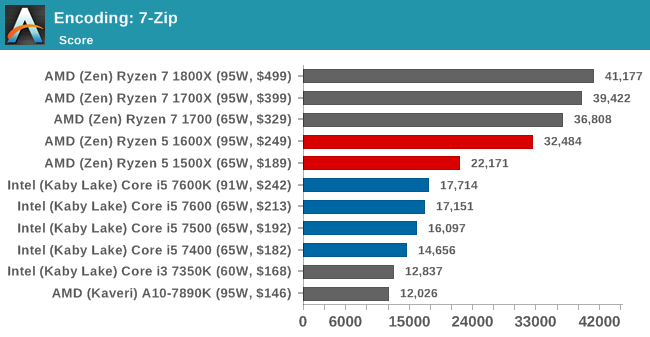
WinRAR 5.40
For the 2017 test suite, we move to the latest version of WinRAR in our compression test. WinRAR in some quarters is more user friendly that 7-Zip, hence its inclusion. Rather than use a benchmark mode as we did with 7-Zip, here we take a set of files representative of a generic stack (33 video files in 1.37 GB, 2834 smaller website files in 370 folders in 150 MB) of compressible and incompressible formats. The results shown are the time taken to encode the file. Due to DRAM caching, we run the test 10 times and take the average of the last five runs when the benchmark is in a steady state.
AES Encoding
Algorithms using AES coding have spread far and wide as a ubiquitous tool for encryption. Again, this is another CPU limited test, and modern CPUs have special AES pathways to accelerate their performance. We often see scaling in both frequency and cores with this benchmark. We use the latest version of TrueCrypt and run its benchmark mode over 1GB of in-DRAM data. Results shown are the GB/s average of encryption and decryption.
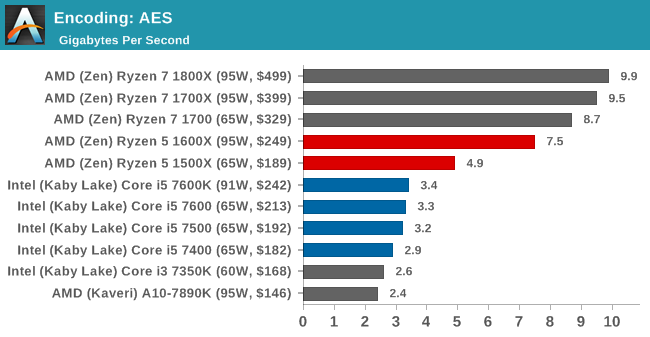
HandBrake H264 and HEVC
As mentioned above, video transcoding (both encode and decode) is a hot topic in performance metrics as more and more content is being created. First consideration is the standard in which the video is encoded, which can be lossless or lossy, trade performance for file-size, trade quality for file-size, or all of the above can increase encoding rates to help accelerate decoding rates. Alongside Google's favorite codec, VP9, there are two others that are taking hold: H264, the older codec, is practically everywhere and is designed to be optimized for 1080p video, and HEVC (or H265) that is aimed to provide the same quality as H264 but at a lower file-size (or better quality for the same size). HEVC is important as 4K is streamed over the air, meaning less bits need to be transferred for the same quality content.
Handbrake is a favored tool for transcoding, and so our test regime takes care of three areas.
Low Quality/Resolution H264: He we transcode a 640x266 H264 rip of a 2 hour film, and change the encoding from Main profile to High profile, using the very-fast preset.
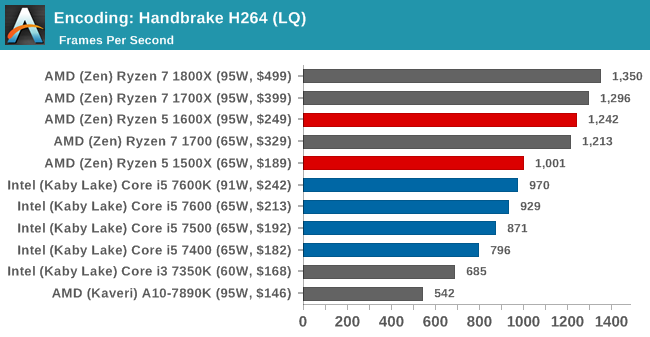
High Quality/Resolution H264: A similar test, but this time we take a ten-minute double 4K (3840x4320) file running at 60 Hz and transcode from Main to High, using the very-fast preset.
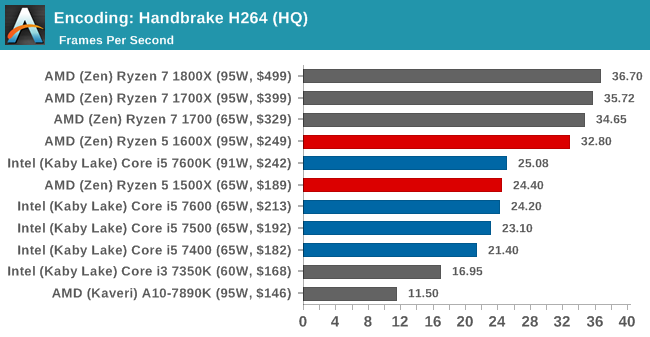
HEVC Test: Using the same video in HQ, we change the resolution and codec of the original video from 4K60 in H264 into 4Kp30 HEVC. This causes a dramatic reduction in filesize (this is a different test to the Ryzen 7 review).
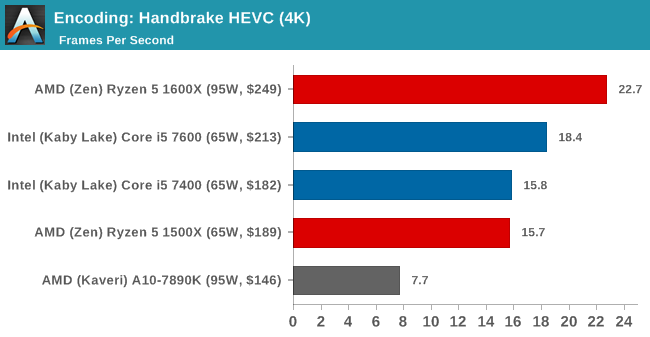


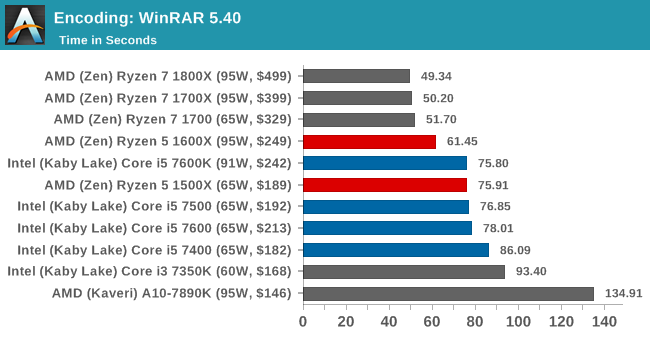








254 Comments
View All Comments
msroadkill612 - Thursday, May 4, 2017 - link
I still dont get what the deal w/ am4 mobos and a pair of m.2 pcie3 nand ssdS in raid 0 is?the x370 (but not the x350) chipset seems to allow an extra 4x pcie3 lanes, directly linked to the cpu (not shared lanes via the chipset), for one or 2 x onboard m.2 sockets.
But its never made clear, to me anyway, that if u use 2 m.2 drives, does each get 2 lanes of pcie3, and therefore are perfectly matched, as desired by raid0.
Surely its not just me that finds a 4GBps storage resource exciting?
(e.g. see storage in specs on link re m.2)
https://www.msi.com/Motherboard/X370-XPOWER-GAMING...
https://www.msi.com/Motherboard/X370-XPOWER-GAMING...
I suspect it translates to 2 x 2 lane pcie3 lanes - 2GBps for each m.2 nvme ssd socket, which surreally, is less than samsung nvme ssdS e.gS maxed out ability of 2.5GB+ ea.
Drives are now too fast for the interface :)
A pair of nand nvme ssds could individually max out each of the 2, 2 pci3 lane sockets (2 GB each), for a total of up to 4GBps read AND WRITE (normally write is much slower than read on single drives). Thats just insane storage speed vs historical norms - a true propeller head would kill for that.
I also hear ssdS are so reliable now, that the risks of raid 0 are considerably diminished.
IMO, a big question prospective ~server & workstation ryzen users should be asking, is if they can manage w/ 8 lanes of pcie3 for their gpu - which seems entirely possible?
"Video cards do benefit from faster slots, but only a little. Unless you are swapping huge textures all the time, even 4x is quite close to 16x because the whole point of 8GB VRAM is to avoid using the PCIe at all costs. Plus many new games will pre-load textures in an intelligent manner and hide the latency. So, running two 8x SLI/CF is almost identical to two 16x cards. The M.2 drives are much faster in disk-intensive workloads, but the differences in consumer workloads (load an application, a game level) are often minimal. You really need to understand the kind of work you are doing. If you are loading and processing huge video streams, for example, then M.2 is worth it. NVMe RAID0 is even more extreme. Will the CPU keep up? Are you reaching a point of diminishing returns? And if you do need such power, you should consider a separate controller to offload the checksuming and related overhead, otherwise you will need 1 core just to keep up with the RAID array."
(interesting last line - w/ 8 cores the new black, who cares?)
This would free up 8x pcie3 lanes for a high end add in card if a big end of town app requires it.
So yeah, re a raid 0 using 2 m.2 slots onboard a suitable 2xm.2 slot am4 mobo, do I get what i need for proper raid0?
i.e.
each slot is 2GBps, so my raid pair is evenly matched, and the pair theoretically capable of 4GBps b4 bandwidth is saturated?
msroadkill612 - Thursday, May 4, 2017 - link
PS re my prev postspecifically from the link
"• AMD® X370 Chipset
....
• 2 x M.2 ports (Key M)
- M2_1 slot supports PCIe 3.0 x4 (RYZEN series processor) or PCIe 3.0 x2 (7th Gen A-series/ Athlon™ processors) and SATA 6Gb/s 2242/ 2260 /2280/ 22110 storage devices
- M2_2 slot supports PCIe 2.0 x4 and SATA 6Gb/s 2242/ 2260 /2280 storage devices
• 1 x U.2 port
- Supports PCIe 3.0 x4 (RYZEN series processor) or PCIe 3.0 x2 (7th Gen A-series/ Athlon™ processors) NVMe storage
* Maximum support 2x M.2 PCIe SSDs + 6x SATA HDDs or 2x M.2 SATA SSDs + 4x SATA HDDs."
it sure seems to be saying the 2nd m.2 poet would be a pcie2 port, and the first m.2 port uses the whole 4 pcie3 lanes linked to the cpu.
thats sad if so - it means no matched pair for raid 0 onboard. only a separate controller would do.
i cannot see why? why cant the 4 pcie3 lanes be shared evenly?
asuchemist - Wednesday, May 17, 2017 - link
Every review I read has different results but same conclusion.rogerdpack - Tuesday, March 27, 2018 - link
"hard to notice" -> "hard not to notice" I think...